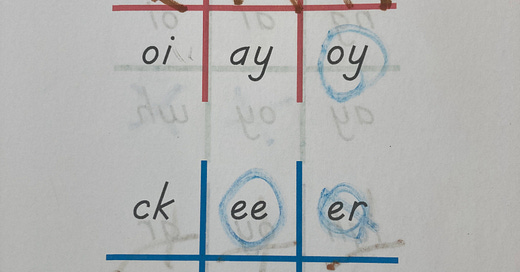Logic of English review
A solid, phonics-based program if 100 Easy Lessons didn't interest your kid. May not want to undertake the entire curriculum.
I’d started teaching our three year old to read using 100 Easy Lessons, a program that Oz used very successfully with our now five year old. It worked great with our middle child for a while, but she tired of it once the stories increased in length. We put reading on pause for a few months while we travelled, and then resumed lessons - this time using Logic of English - under the belief that she was truly interested in learning to read, just that 100EL wasn’t a good fit.
This review covers Foundations Level B, our starting point. The entire program, however, is extensive, covering reading, writing, and grammar rules.
LoE was developed to accommodate different learning styles. It emphasizes fun and engagement in a way that 100EL does not. I imagine it being a great fit for classrooms, as it introduces a lot of physical activity into each lesson. It is charmingly colorful and full of interactive activities: think reading spliced with cutting and pasting, hide and seek, racing games, and bingo. These features have made it very motivating for our three-year-old (she enthusiastically wants to do it most mornings), but also much slower-paced than it could be. It takes 30-60 minutes to complete a lesson, depending on how thorough you are, and each lesson only introduces a few new concepts.
Foundations Level B covers vowel sounds and a lot of the most common “phonograms”, including those you see above. It’s hard not to appreciate their diligence: each sound is covered remarkably thoroughly, optimistically providing rules that kids could somehow remember, such as that the “silent final e” changes vowel sounds and comes after e.g. a “v” at the end of words, but of course you should never pronounce “gave” the way we pronounce “have” because that would be too… logical.
Igh ei i, I admit to being rather lazy with my adherence to the format of each lesson, as the logic of English’s inherited idiosyncrasies bore me confuse me annoy me cause my kids to conclude that they’d “have had a much easier time learning the Logic of Turkish!”
I can’t imagine sustaining enthusiasm for learning all of the (all of the!) various phonograms (graphemes), and it’s clear to me that there are rapidly diminishing returns on learning all of these rules. While there is value in developing some understanding, I don’t think it’s going to be realistic to develop all of the understanding, and as I go through the lessons myself, I’m impressed by just how few rules I was ever explicitly taught. Exposure through reading will be our next step.
Some downsides: it’s more expensive than other options (especially if you live outside the US), it’s slow-paced, and there are a lot of bits and pieces (a teacher’s manual, student workbook, numerous flash cards, teeny little pieces of cardboard letters, numerous reading books, etc).
Here are some reasons you may like to try it:
It’s very engaging - a plus for younger kids.
No prep required. Just open the workbook and it tells you exactly what to do for each lesson. It’s also very flexible; you’ll quickly learn which parts need more focus and which can be skipped. For example, we largely ignore the handwriting sections and rule memorization.
It’s very thorough. If you’re like me, you’ll probably learn a thing or two yourself!
It ramps up reading volume in a relatively approachable way, such as:







I've been running into similar problems with my three year old and 100 Easy Lessons. We breezed to about halfway through the book, then the novelty wore off and she completely lost interest. Part of our problem is that some of the stories capture her attention (mom is mad at me!), whereas others don't (an ant sat on a log. that is an ant).
Our new morning routine is for me to type up a funny, exaggerated story, use an LLM to generate a companion image, then print it out and add phonetic symbols for her to read. Works pretty well to sustain interest but isn't systematic in any way.
After reading your post maybe I should give Logic of English a shot (or maybe I'll wait and see how it goes for you all). To be honest though the title kind've scares me. I've learned many foreign languages in my adult life and English seems far and away the least logical (which I think you also allude to).